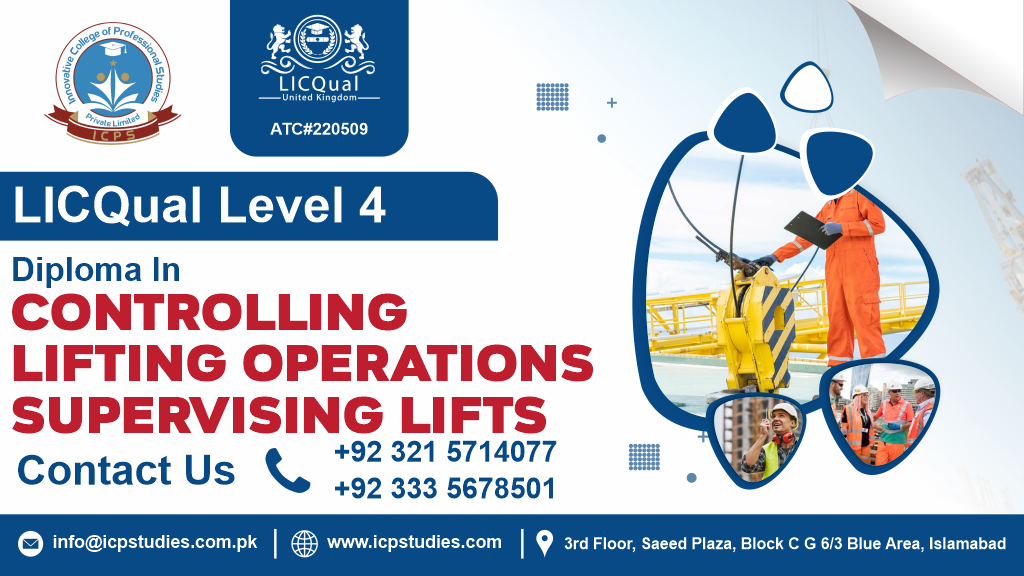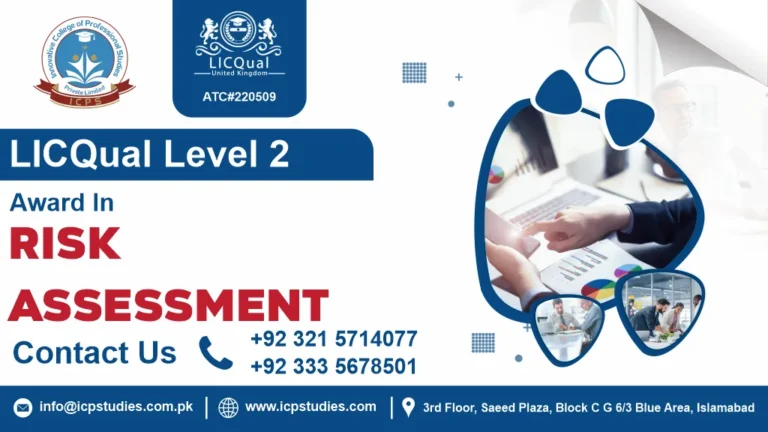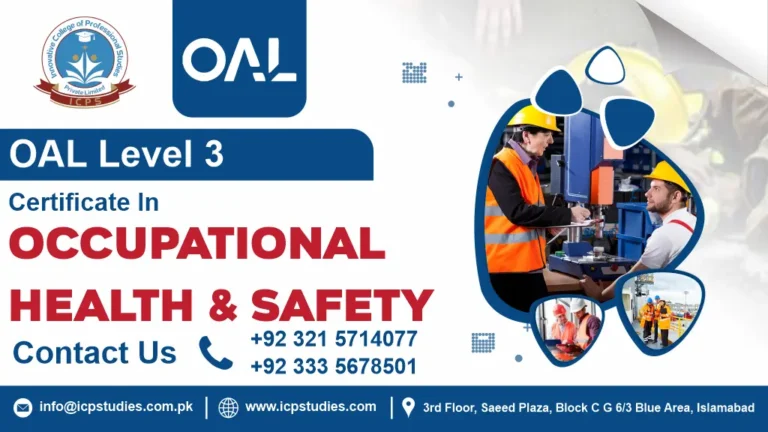In the realm of construction and heavy industries, the art of crane operation stands as a cornerstone. The safe and efficient movement of heavy loads is not just a task but a specialized skill that demands precision, knowledge, and adherence to stringent safety protocols. For those seeking to elevate their expertise in this crucial field, the Level 4 Diploma in Controlling Lifting Operations – Supervising Lifts offers a comprehensive pathway towards mastery.
The Level 4 Diploma in Controlling Lifting Operations – Supervising Lifts is designed to equip individuals with the expertise to supervise lifting operations safely and efficiently. Developed to meet the demands of modern industries, this diploma covers a wide array of topics essential for crane operation and supervision.
Level 4 Diploma in Controlling Lifting Operations – Supervising Lifts stands as a beacon of excellence. By equipping individuals with the knowledge and skills to supervise lifting operations effectively, this diploma not only elevates the expertise of crane operators but also contributes to a safer and more efficient work environment. For those seeking to master the art of crane operations and advance their careers in the heavy industries sector, this diploma is indeed a pathway to success.
All About Level 4 Diploma in Controlling Lifting Operations –Supervising Lifts
Course Overview
The Level 4 Diploma in Controlling Lifting Operations – Supervising Lifts is a specialized qualification designed to provide individuals with the necessary knowledge and skills to supervise lifting operations safely and efficiently. It is typically targeted towards professionals working in industries where crane operations are common, such as construction, manufacturing, logistics, and maritime sectors.
Level 4 Diploma in Controlling Lifting Operations – Supervising Lifts, individuals are equipped with the expertise to supervise lifting teams, coordinate operations, and maintain a safe working environment. This qualification not only enhances their career prospects but also contributes to the overall safety and efficiency of lifting operations within their respective industries.
Study Units
Admission Criteria
- Introduction to Fire Incident Investigation:
- Understand the fundamentals of fire incident investigation techniques and methodologies.
- Identify the key factors contributing to fire incidents in various contexts.
- Demonstrate knowledge of the principles of fire dynamics and behavior.
- Analyze fire incident scenes and gather relevant evidence for investigation purposes.
- Principles of Lifting Operations Supervision:
- Develop a comprehensive understanding of the principles governing lifting operations supervision.
- Identify different types of lifting equipment, their components, and their respective applications.
- Demonstrate proficiency in planning and organizing lifting operations.
- Apply effective supervision techniques to ensure the safe and efficient execution of lifting activities.
- Risk Assessment and Risk Management in Lifting Operations:
- Conduct thorough risk assessments for lifting operations, considering potential hazards and their associated risks.
- Implement risk management strategies to mitigate identified risks and ensure the safety of lifting activities.
- Understand the importance of continuous monitoring and review of risk control measures in lifting operations.
- Legal and Regulatory Requirements for Supervising Lifts:
- Understand the relevant legal and regulatory frameworks governing lifting operations in specific jurisdictions.
- Interpret and apply relevant legislation, standards, and codes of practice related to lifting supervision.
- Ensure compliance with statutory requirements and industry best practices in lifting operations.
- Effective Communication and Coordination in Lifting Operations:
- Develop effective communication skills for coordinating lifting operations among team members and stakeholders.
- Demonstrate the ability to convey instructions clearly and accurately in a lifting operation context.
- Foster teamwork and collaboration to optimize efficiency and safety in lifting activities.
- Equipment and Technology in Lifting Supervision:
- Gain knowledge of the latest lifting equipment and technologies available in the industry.
- Understand the capabilities and limitations of different lifting equipment and technologies.
- Utilize equipment and technology effectively to enhance the safety and efficiency of lifting operations.
- Incident Management and Emergency Response in Lifting Activities:
- Develop proficiency in incident management and emergency response protocols specific to lifting activities.
- Demonstrate the ability to effectively coordinate emergency response efforts in the event of lifting-related incidents.
- Implement post-incident procedures to analyze root causes and prevent recurrence of similar incidents in the future.
Ideal Candidat
- Educational Background:
- A minimum of a high school diploma or equivalent qualification is often required.
- Some institutions may prefer candidates with a background in engineering, construction, or related fields.
- Work Experience:
- Relevant work experience in industries involving lifting operations, such as construction, manufacturing, logistics, or maritime sectors, is often preferred.
- Candidates with prior experience working as crane operators, riggers, or lifting technicians may be given preference.
- Certifications or Licenses:
- Depending on the jurisdiction and industry requirements, candidates may need to hold relevant certifications or licenses related to lifting operations or crane operation.
- For example, candidates may need to possess certifications such as the Crane Operator Certification or Rigging Certification.
- Health and Safety Requirements:
- Candidates may be required to meet specific health and safety standards to ensure they can safely participate in practical training exercises.
- This may include passing a medical examination to demonstrate physical fitness for working in environments involving lifting operations.
- Language Proficiency:
- Proficiency in the language of instruction (usually English) may be required to ensure candidates can effectively comprehend course materials and participate in discussions.
- Additional Requirements:
- Some institutions may require candidates to undergo an interview or assessment process to evaluate their suitability for the course.
- Certain courses may have specific prerequisites or recommended prior knowledge in related subjects such as mechanical engineering, physics, or mathematics.
It’s important for prospective candidates to review the specific entry requirements outlined by the institution or training provider offering the Level 4 Diploma in Controlling Lifting Operations – Supervising Lifts to ensure they meet the eligibility criteria before applying for the course.
Learning Outcomes
- Crane Operators Seeking Advancement: Crane operators looking to progress in their careers and take on supervisory roles within their organizations can benefit greatly from this diploma. It provides them with the knowledge and skills necessary to effectively supervise lifting operations and coordinate teams.
- Lifting Technicians and Riggers: Professionals working as lifting technicians or riggers who are responsible for rigging and hoisting operations can enhance their expertise by undertaking this diploma. It equips them with the necessary competencies to oversee lifting activities safely and efficiently.
- Construction Industry Professionals: Individuals working in the construction industry, including site managers, project engineers, and safety officers, can benefit from this course. It enables them to understand the principles of lifting operations supervision and ensure compliance with health and safety regulations on construction sites.
- Manufacturing and Logistics Personnel: Professionals involved in manufacturing, warehousing, and logistics operations where lifting equipment is utilized can gain valuable insights from this diploma. It equips them with the skills to supervise lifting operations, optimize efficiency, and minimize risks associated with material handling.
- Safety and Compliance Officers: Safety and compliance officers responsible for overseeing lifting operations within organizations can benefit from this course. It provides them with a deeper understanding of risk assessment, regulatory requirements, and incident management protocols related to lifting activities.
- Career Changers and Aspiring Professionals: Individuals looking to enter the field of crane operations and lifting supervision can use this diploma as a stepping stone. It offers them a comprehensive understanding of lifting equipment, safety protocols, and supervisory skills necessary to succeed in the industry.
Overall, the Level 4 Diploma in Controlling Lifting Operations – Supervising Lifts caters to a diverse range of professionals seeking to enhance their knowledge, skills, and career prospects in the field of lifting operations supervision. Whether they are seasoned crane operators aiming for career advancement or newcomers aspiring to enter the industry, this course provides them with the essential competencies to excel in their roles.
FAQs about Level 4 Diploma in Controlling Lifting Operations –Supervising Lifts







